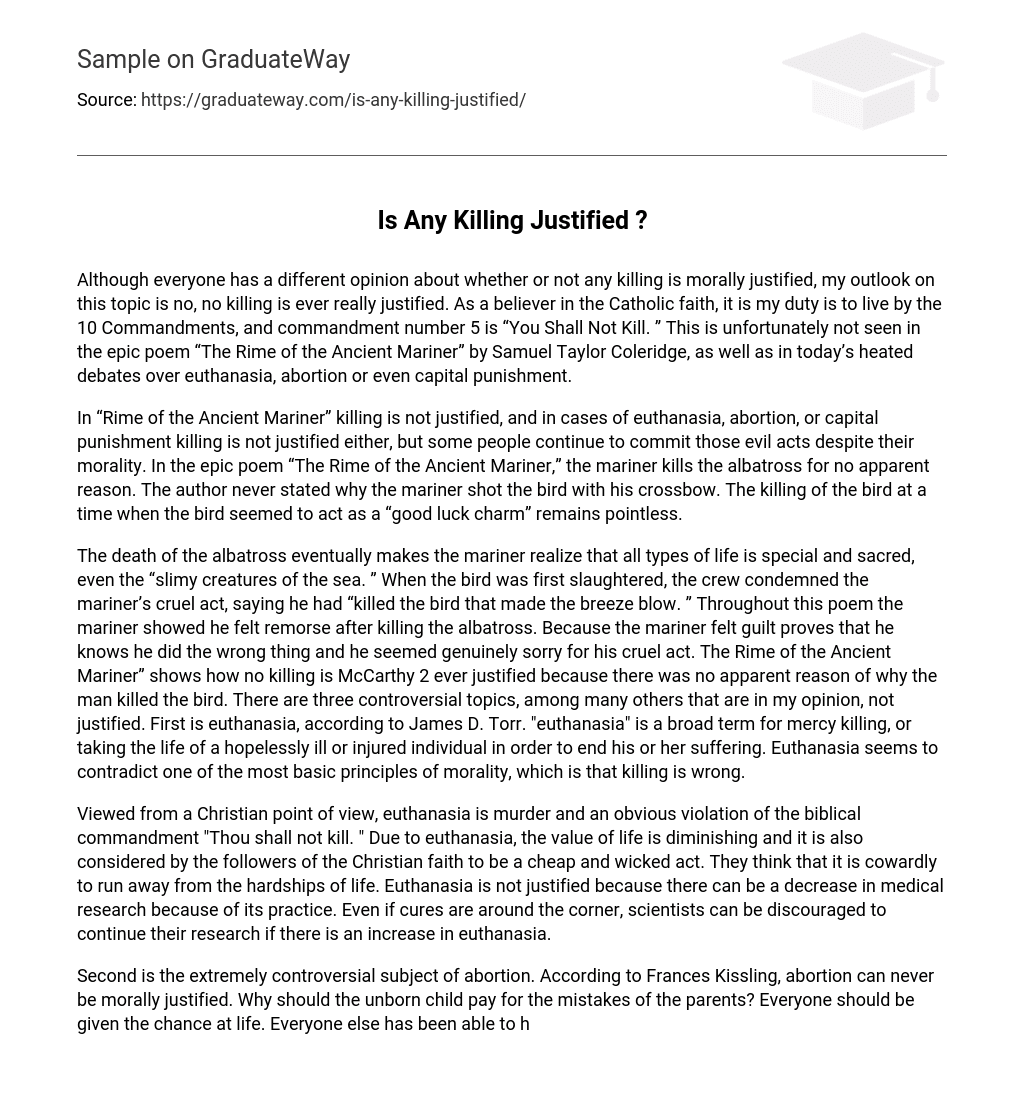Regardless of varying perspectives on the ethics of taking a life, I hold a steadfast belief that no form of killing can ever be rationalized. As an unwavering Catholic, I am duty-bound to adhere to the guidelines set forth in the 10 Commandments, specifically Commandment 5 which unequivocally declares “You Shall Not Kill.” Unfortunately, this fundamental principle is disregarded both in Samuel Taylor Coleridge’s renowned poem “The Rime of the Ancient Mariner” and in ongoing debates concerning euthanasia, abortion, and capital punishment.
“The Rime of the Ancient Mariner” explores the unjustifiable nature of killing in different situations, such as euthanasia, abortion, capital punishment, and the slaughter of an innocent albatross. Despite this understanding, certain individuals continue to engage in these immoral actions. Inexplicably, the mariner takes it upon himself to kill a supposedly auspicious albatross without any rationale provided by the author. The act of shooting this bird holds no significance or purpose.
The death of the albatross in “The Rime of the Ancient Mariner” teaches the mariner a valuable lesson about the value of all life, even that of sea creatures. Initially, his fellow crew members condemned him for killing the bird that brought favorable winds. Throughout the poem, the mariner expresses regret and genuine sorrow for his actions, showing that he recognizes his wrongdoing. This emphasizes the idea that no killing can ever be justified without a valid reason, just as there are other controversial topics like euthanasia which contradict moral principles by involving mercy killing to alleviate suffering in terminally ill or injured individuals.
According to Christian beliefs, euthanasia is considered murder and a clear violation of the biblical commandment “Thou shall not kill.” It is seen as devaluing life and condemned as morally wrong and sinful by Christians. They perceive euthanasia as an act of cowardice, an attempt to avoid the difficulties and hardships of life. Furthermore, Christians argue that euthanasia has the potential to hinder medical research, discouraging scientists from pursuing advancements if it becomes more widespread.
According to Frances Kissling, the highly disputed topic of abortion raises moral concerns as the unborn child should not suffer the consequences of their parents’ mistakes. Every individual deserves the opportunity to live, just like everyone else has had. The Catholic Church shares the belief that abortion is morally unacceptable as they consider life to begin at conception. Additionally, the Church promotes adoption as an alternative option to abortion.
Proponents of the pro-life stance advocate for adoption instead of abortion, asserting that pro-choice advocates have concealed the graphic and violent nature of abortion. Personally, I firmly believe that terminating the life of an unborn child is never permissible under any circumstances. Furthermore, can we ever find justification for capital punishment? Similar to author John Kavanaugh’s perspective, I also hold the belief that it cannot be justified. The death penalty contradicts fundamental moral principles as it necessitates dehumanization.
The writer argues that capital punishment and similar acts of intentional killing lessen the value of human life by treating people as expendable objects. They hold the belief in the sacredness and irreplaceability of each individual’s life, seeing intentional killing as a moral detriment. As a result, they push for the elimination of harsh penalties like capital punishment which unfairly strip individuals of their right to life, an exclusive authority held by God.
Despite varying viewpoints on the moral grounds for taking a life, it is our duty as custodians of God’s creation to demonstrate compassion and affection towards each other. It is crucial to acknowledge that killing is never an answer and only alienates us from the divine. This notion becomes apparent in the senseless slaying of the albatross depicted in “The Rime of the Ancient Mariner,” along with three contentious subjects: euthanasia, abortion, and capital punishment.
Upper Saddle River; NY Prentice Hall, 2002. 686-7089. Print.
Kavanaugh, John. “The Death Penalty Violates the Sanctity of Life. ” Opposing Viewpoints: The Death Penalty. Ed. Mary E. Williams. San Diego: Greenhaven Press, 2002. Opposing Viewpoints Resource Center. Web. 13 Apr. 2010.
Kissling, Frances. “The place for individual conscience. ” Journal of Medical Ethics 27. 5 (2001): ii24. Student Resource Center – Gold. Web. 13 Apr. 2010.
“Introduction to Euthanasia: Opposing Viewpoints. ” Opposing Viewpoints: Euthanasia. Ed. James D. Torr. San Diego: Greenhaven Press, 2000. Web. 13 Apr. 2010.





